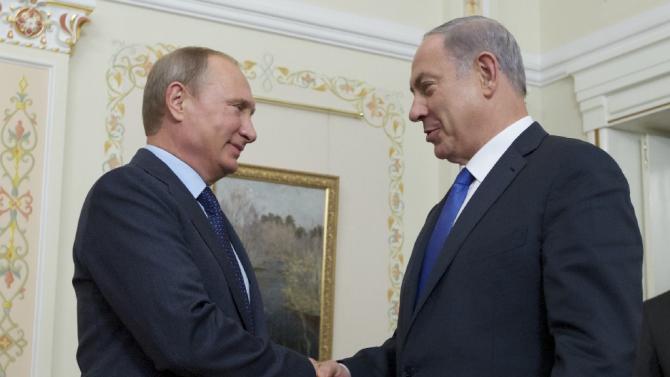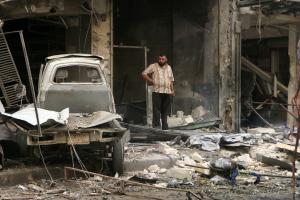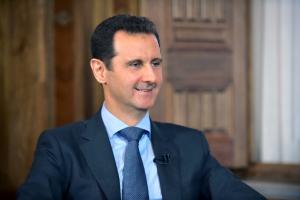Russian embassy 'shelled' amid Syria build-up fears
Moscow (AFP) - Russia demanded action Monday after a shell
landed in its embassy compound in Damascus, as President Vladimir Putin
tried to reassure Israel over an apparent military build-up in Syria
that US officials now say includes combat aircraft.
Moscow said a mortar fell on the embassy compound
in the Syrian capital on Sunday without causing damage and blamed forces
battling President Bashar al-Assad and their "outside sponsors" for the
shelling.
"We await a clear standpoint on this terrorist act from all members of the international community, including regional actors," Russia's foreign ministry said in a statement.
"What is needed is not just words, but concrete action."
The Russian embassy, in Damascus' Mazraa neighbourhood, has been hit before. In May, one person was killed by mortar rounds that landed nearby. Three were hurt when mortar rounds landed inside the compound in April.
The United States says Russia -- one of the few remaining allies of Assad -- is deploying personnel and military hardware to Syria, sparking fears Moscow is getting ready to fight alongside government forces.
On Monday, two US officials told AFP that Russia has deployed 28 ground attack and fighter planes at an airfield in the western Syrian province of Latakia.
One of the officials added there were also about 20 Russian combat and transport helicopters at the base. The officials spoke on condition of anonymity.
Moscow has also sent troops, tanks, temporary housing, armoured personnel carriers and artillery units to Syria in recent weeks, US officials have said.
But Russia contends any such support falls in line with existing defence contracts.
Moscow and Washington on Friday launched military talks on the four-year conflict that has claimed nearly 250,000 lives.
- Israeli worries -
Israeli Prime Minister Benjamin Netanyahu jetted in to Moscow on Monday with his army and intelligence chiefs to seek reassurance from Moscow over the deployment of forces.
"It was very important to come here in order to clarify our position and to do everything to avoid any misunderstandings between our forces," Netanyahu said at the start of the meeting.
Netanyahu said he was determined to stop arms deliveries to Lebanon's Shiite Hezbollah movement and accused Syria's army and Iran of trying to create a "second front" against Israel.
Putin said Russia's actions in the Middle East "always were and will be very responsible" and downplayed the threat by Syrian forces to Israel.
"We know and understand that the Syrian army and Syria in general is in such a state that it isn't up to opening a second front -- it is trying to maintain its own statehood," he said in comments broadcast on Russian television.
Reports in Israeli press said the aim of Netanyahu's visit was to avoid any possible clashes between Israeli and Russian jets that could operate over Syria.
Israeli military officials reportedly fear that any Russian air presence could cut their room for manoeuvre after several purported strikes on Iranian arms transfers to Hezbollah through Syria in recent months that were not officially acknowledged by Israeli authorities.
- 'Lack of faith' -
Moscow has also been on a diplomatic push to get a US-led coalition of Western and regional powers fighting the Islamic State group to join forces with Assad against the jihadists.
Western diplomats suggest Putin -- who has been isolated by the West over the crisis in Ukraine -- is trying to switch focus to Syria, ahead of a key address to the United Nations General Assembly on September 28.
Israel opposes Assad's regime but has sought to avoid being dragged into the conflict in neighbouring Syria.
It also fears that Iran could increase its support for Hezbollah and other militant groups as international sanctions are gradually lifted under a July nuclear deal that Moscow helped negotiate between Tehran and world powers.
Netanyahu is set to fly to the United States for talks with President Barack Obama in November in a bid to ease tensions over the Iran deal.
But Israeli left-leaning daily Haaretz said the visit to Moscow appeared to reflect Netanyahu's "lack of faith in the ability and willingness of the US to protect Israeli security interests."
"We await a clear standpoint on this terrorist act from all members of the international community, including regional actors," Russia's foreign ministry said in a statement.
"What is needed is not just words, but concrete action."
The Russian embassy, in Damascus' Mazraa neighbourhood, has been hit before. In May, one person was killed by mortar rounds that landed nearby. Three were hurt when mortar rounds landed inside the compound in April.
The United States says Russia -- one of the few remaining allies of Assad -- is deploying personnel and military hardware to Syria, sparking fears Moscow is getting ready to fight alongside government forces.
On Monday, two US officials told AFP that Russia has deployed 28 ground attack and fighter planes at an airfield in the western Syrian province of Latakia.
One of the officials added there were also about 20 Russian combat and transport helicopters at the base. The officials spoke on condition of anonymity.
Moscow has also sent troops, tanks, temporary housing, armoured personnel carriers and artillery units to Syria in recent weeks, US officials have said.
But Russia contends any such support falls in line with existing defence contracts.
Moscow and Washington on Friday launched military talks on the four-year conflict that has claimed nearly 250,000 lives.
- Israeli worries -
Israeli Prime Minister Benjamin Netanyahu jetted in to Moscow on Monday with his army and intelligence chiefs to seek reassurance from Moscow over the deployment of forces.
"It was very important to come here in order to clarify our position and to do everything to avoid any misunderstandings between our forces," Netanyahu said at the start of the meeting.
Netanyahu said he was determined to stop arms deliveries to Lebanon's Shiite Hezbollah movement and accused Syria's army and Iran of trying to create a "second front" against Israel.
Putin said Russia's actions in the Middle East "always were and will be very responsible" and downplayed the threat by Syrian forces to Israel.
"We know and understand that the Syrian army and Syria in general is in such a state that it isn't up to opening a second front -- it is trying to maintain its own statehood," he said in comments broadcast on Russian television.
Reports in Israeli press said the aim of Netanyahu's visit was to avoid any possible clashes between Israeli and Russian jets that could operate over Syria.
Israeli military officials reportedly fear that any Russian air presence could cut their room for manoeuvre after several purported strikes on Iranian arms transfers to Hezbollah through Syria in recent months that were not officially acknowledged by Israeli authorities.
- 'Lack of faith' -
Moscow has also been on a diplomatic push to get a US-led coalition of Western and regional powers fighting the Islamic State group to join forces with Assad against the jihadists.
Western diplomats suggest Putin -- who has been isolated by the West over the crisis in Ukraine -- is trying to switch focus to Syria, ahead of a key address to the United Nations General Assembly on September 28.
Israel opposes Assad's regime but has sought to avoid being dragged into the conflict in neighbouring Syria.
It also fears that Iran could increase its support for Hezbollah and other militant groups as international sanctions are gradually lifted under a July nuclear deal that Moscow helped negotiate between Tehran and world powers.
Netanyahu is set to fly to the United States for talks with President Barack Obama in November in a bid to ease tensions over the Iran deal.
But Israeli left-leaning daily Haaretz said the visit to Moscow appeared to reflect Netanyahu's "lack of faith in the ability and willingness of the US to protect Israeli security interests."








No comments:
Post a Comment